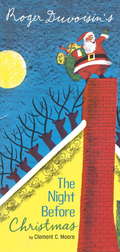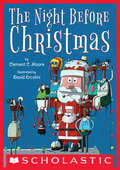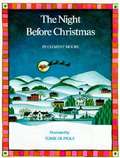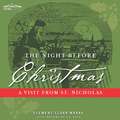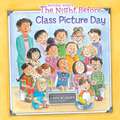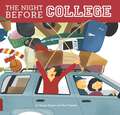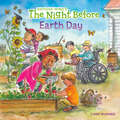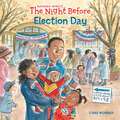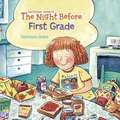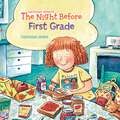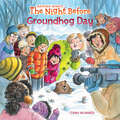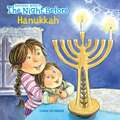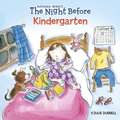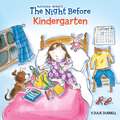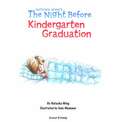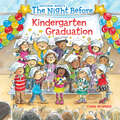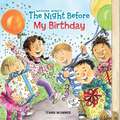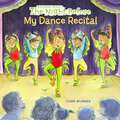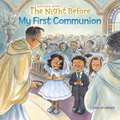- Table View
- List View
The Night Before Christmas
by Clement C. Moore Roger DuvoisinRediscover a Christmas treasure--unavailable for decades--from beloved Caldecott Medal-winning illustrator Roger Duvoisin. With glorious illustrations by Caldecott Medal-winning illustrator Roger Duvoisin, this edition of Clement C. Moore's "The Night Before Christmas" is a perfect holiday read-aloud for families. And with a tall, narrow size, it's also just right for tucking into a Christmas stocking, making it a wonderful holiday gift.
The Night Before Christmas
by Clement C. MooreA refreshing spin on the classic Christmas poem, featuring funny, over the top illustrations.In this hysterical version of “The Night Before Christmas,” David Ercolini’s over-the-top illustrations will have readers saying, “Ho! Ho! Ho!” Creatures of all shapes and all sizes will be stirring with laughter in this overly decked out, Christmas-splendored illustrated picture book!Ercolini breathes new life into an unrivaled classic with his vibrant illustrations featuring fun, accessible scenes of holiday mayhem and spirited cheer. It’s “The Night Before Christmas” as you’ve never seen it before!
The Night Before Christmas
by Clement Moore"Twas the night before Christmas and all through the house..." begins Clement Moore's beloved classic Christmas poem which was originally titled: "A Visit from St. Nick." "Happy Christmas to all. And to all a good night." This file should make an excellent embossed braille copy.
The Night Before Christmas: A Brick Story (Magic Windows Ser.)
by Clement C. MooreSpread the Christmas cheer with this whimsical retelling of Clement C. Moore’s cherished poem, "A Visit from St. Nicholas. ” This new edition of the classic features the text of Moore’s original poem, illustrated with beautifully detailed LEGO brick scenes and characters. See the colorful stockings hung by the chimney in the fanciful brick house, and look on at the visions of dancing brick sugarplums. Turn the pages to reveal Saint Nicholas with his bundle of toys and his eight trusty reindeer, and watch as he magically slides down the chimney to bring presents to the good little girls and boys before shouting, "Now dash away, dash away, dash away all!” This treasured Christmas poem in brick will quickly become the highlight of your holiday storybooks and a great new tradition for the whole family!
The Night Before Christmas: A Light-up Book
by Clement Clarke Moore Lindsay Dale-ScottShare the magic of Christmas with Clement C. Moore's classic poem and dazzling twinkle lights in this new board book for the whole family. "Twas the night before Christmas and all through the house, not a creature was stirring, not even a mouse!"Snuggle under a warm blanket with your family this holiday and share in the magic and wonder of Clement C. Moore's timeless poem, "The Night Before Christmas." With jolly illustrations, this is sure to become a staple of your holidays for years to come.
The Night Before Christmas: A Visit from St. Nicholas (Magic Windows Ser.)
by Clement Clark Moore T. C. Boyd“'Twas the night before Christmas, when all through the house / Not a creature was stirring, not even a mouse” -From The Night Before Christmas The Night Before Christmas, originally published as A Visit from St. Nicholas on December 23, 1823, in the Troy Sentinel, became America’s favorite Christmas poem. After the poem was published anonymously, it was attributed to CLEMENT CLARK MOORE in 1837. However, scholars have debated the identity of the author of this poem and some believe it was written by Henry Livingston, Jr., (1748–1828), a New York farmer who also wrote poetry. The Night Before Christmas has had a great influence on the American notion of Santa Claus and on its tradition of Christmas gift-giving, which, before the poem, had been inspired by the Dutch figure of St. Nicholas. This unique edition of the famed Christmas poem, features the original engravings, from 1849, by T.C. Boyd. This American classic is a great gift for the Christmas season as well as for collectors of traditional American literature.
The Night Before Class Picture Day (The Night Before)
by Natasha WingIn this Night Before book, kids get ready for that all-important moment of the school year: class picture day!It's the night before class picture day, and kids all down the block are getting ready. Everyone wants to look perfect for the photo. They fix their hair, practice smiles, and choose outfits. At school the next day, they try to stay picture-perfect. Will everything look perfect for the big moment when they say, &“Cheese?&”
The Night Before College (The Night Before)
by Sonya Sones Ava Tramer“Just the thing to tuck into a teen’s stocking (or maybe shower caddy).” --Publishers WeeklySonya Sones, author of YA novel What My Mother Doesn't Know, has written a nifty, witty take-off of The Night Before Christmas with her daughter Ava Tramer, a recent Harvard grad. This small-format jacketed hardcover takes a look back at all the stops on the route to college--touring campuses, prepping for SATs, writing the dreaded essay, getting the thumbs-up-or-down news, and finally, at long last, packing and setting off for the next chapter. A perfect gift for the college bound.
The Night Before Earth Day (The Night Before)
by Natasha WingA community gets ready to celebrate Earth Day!A neighborhood begins to work together to make the world a better place! They create a community garden, plant trees, and prepare to release butterflies on Earth Day. Join them as they go green in this installment of the Night Before series, told in the style of Clement C. Moore's classic tale.
The Night Before Election Day (The Night Before)
by Natasha WingWave your flags! It's time to vote! Election Day is right around the corner in the latest big moment to be celebrated in Natasha Wing's best-selling series.Yes! It's almost here. And the big question is: Who will be our next president? Will our leader be a he or a she? A young citizen gives her take on politics and Election Day in this charming story told in the style of Clement C. Moore's holiday poem.
The Night Before Father's Day
by Natasha Wing Amy WummerThe newest title in Natasha Wing's bestselling Night Before series!It's the night before Father's Day, and Mom and the kids have a plan to surprise Dad with a special gift. When Dad goes for a bike ride, everyone gets to work. Dad wakes up the next day to find his garage newly organized and his car sparkly clean. So, of course, he celebrates by taking everyone for a spin!
The Night Before First Grade
by Natasha WingThis humorous take on Clement Moore's classic tale--starring a girl excited to start the new school year with her best friend--offers reassurance to help all first-graders through their own back-to-school jitters.
The Night Before First Grade (The Night Before)
by Natasha WingIt's the night before the Big Day—first grade. Penny is excited to start the year with her best friend right beside her in the same classroom. This humorous take on Clement C. Moore's classic tale has a perfect twist ending that will surprise readers—as well as the “heroine” of the story—and help all about-to-be first-graders through their own back-to-school jitters.
The Night Before Groundhog Day (The Night Before)
by Natasha WingWhat's special about February 2nd? It's Groundhog Day--the latest occasion to be celebrated in Natasha Wing's best-selling series.The anticipation is building: Will the groundhog see his shadow? Will there be six more weeks of winter? Get ready for this festive occasion with the countdown to Groundhog Day in this fun, rhyming story told in the style of Clement C. Moore's holiday poem.
The Night Before Halloween
by Sondi MillerOnce a year on Halloween, Monsters eagerly prepare and hope for that special gift from the Great Jack-O-Lantern. His arrival is anticipated more than ever before in this short unforgettable poem. May your memories be as full of horror as the Monsters and their kin on this celebrated eve.
The Night Before Hanukkah (The Night Before)
by Natasha WingThe newest title in the bestselling Night Before series is the perfect gift for every girl and boy who celebrates Hanukkah!It's the night before the eight-day celebration of Hanukkah begins, and everyone is excited! Each evening, the family gathers to light the candles and share holiday traditions such as playing dreidel, eating latkes, and exchanging gifts. The seventeenth title in Natasha Wing's bestselling series, The Night Before Hanukkah captures all the joy and love in one of the most wonderful times of the year!
The Night Before Kindergarten
by Natasha Wing Julie Durrell'Twas the night before kindergarten, and as they prepared, kids were excited, and a little bit scared. It's the first day of school! Join the kids as they prepare for kindergarten, packing school supplies, posing for pictures, and the hardest part of all--saying goodbye to Mom and Dad. But maybe it won't be so hard once they discover just how much fun kindergarten really is! This is an uplifting takeoff on the classic Clement C. Moore Christmas poem. Picture descriptions added to picture only pages.
The Night Before Kindergarten (The Night Before)
by Natasha WingIt's the first day of school! Join the kids as they prepare for kindergarten, packing school supplies, posing for pictures, and the hardest part of all—saying good-bye to Mom and Dad. But maybe it won't be so hard once they discover just how much fun kindergarten really is! Colorful illustrations illuminate this uplifting takeoff on the classic Clement C. Moore Christmas poem.
The Night Before Kindergarten Graduation (The Night Before)
by Natasha WingIt's time to celebrate kindergarten graduation in Natasha Wing's best-selling series featuring rhyming text in the style of the classic Clement C. Moore holiday poem. Get ready for a major milestone: kindergarten graduation! Of course, there's a lot of preparation the night before as kids prepare for the momentous occasion. This is a great school-year follow-up to The Night Before Kindergarten!
The Night Before Kindergarten Graduation (The Night Before)
by Natasha WingIt's time to celebrate kindergarten graduation in Natasha Wing's best-selling series featuring rhyming text in the style of the classic Clement C. Moore holiday poem.Get ready for a major milestone: kindergarten graduation! Of course, there's a lot of preparation the night before as kids prepare for the momentous occasion. This is a great school-year follow-up to The Night Before Kindergarten!
The Night Before Mother's Day
by Natasha WingIt's the night before Mother's Day, and Dad and the kids are determined to show Mom just how much they love her. They whip up a cake from scratch, and offer a special coupon for a day at the spa, right in their own kitchen!
The Night Before My Birthday
by Natasha WingThe decorations are up, the table is set, and the food is ready - but what happens when there is an ice cream emergency? Once again Natasha Wing has written a story that is sure to appeal to every child getting ready for a birthday. The book is told by and seen through the eyes of the birthday child, so it is gender neutral and a fun gift for any birthday girl or boy.
The Night Before My Birthday (The Night Before)
by Natasha WingThe Night Before My Birthday captures all the excitement and anticipation that every child experiences in the lead-up to their special day. The decorations are up, the table is set, and the food is ready - but what happens when there is an ice cream emergency? Once again Natasha Wing has written a story that is sure to appeal to every child getting ready for a birthday. The book is told by and seen through the eyes of the birthday child, so it is gender neutral and a fun gift for any birthday girl or boy.
The Night Before My Dance Recital (The Night Before)
by Natasha WingCelebrating a landmark event in the life of all dancers!It's the night before a young girl's first dance recital. At the dress rehearsal, she and her class go over the steps one last time. What if she messes up? she worries. But the next day, she's ready to perform. When the class spins left she spins right! Without missing a beat, she keeps on dancing and smiling. The Night Before My Dance Recital celebrates this with humor, warmth, and engaging illustrations by Amy Wummer.
The Night Before My First Communion (The Night Before)
by Natasha WingA brother and sister celebrate and prepare for this Catholic rite of passage in the twenty-fourth title in Natasha Wing's best-selling paperback series featuring rhyming text in the style of the classic Clement C. Moore holiday poem.On the night before their First Communion, a brother and sister get ready for this important event. All the family is there--family, grandparents, godparents--to help them prepare for the following day.
